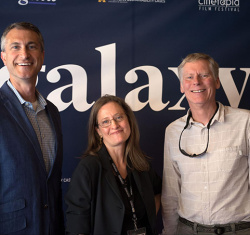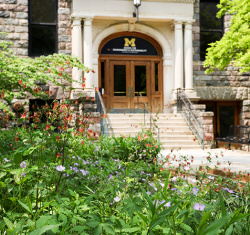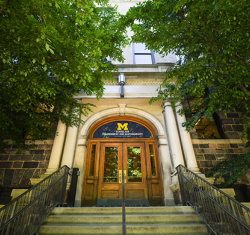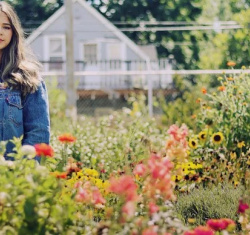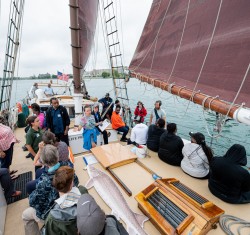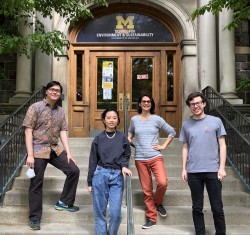
 back to all faculty
back to all faculty
Rebecca D. Hardin

About
My Digital and Environmental Justice work engages in knowledge partnerships and collaborative research in South Africa, France, Ethiopia, Kenya, Gabon, the U.S. and Canada. I work in teams of researchers from engineering to ecology or epidemiology, making innovations more inclusive, communications more effective, and education more collaborative. I have a PhD in cross-subfield anthropology (biological and cultural) from Yale University, and an undergraduate degree in Modern Culture and Media from Brown University. I have taught at Yale, Harvard, McGill, the Sorbonne, the University of Bangui in Central African Republic, the Mpala Field Station in Laikipia, Kenya, and the University of Science and Technology of Masoukou in Franceville, Gabon. I lead learning innovation projects involving open source software and knowledge-community-controlled content on the platform I co-founded, Gala (www.learngala.com). We move slow and make things.
Publications
- 2020. Human Ecology. Perceptions of Local Vulnerability and the Relative Importance of Climate Change in Rural Ecuador. Helen Gutierrez, Betty Corozo, Jessica Dimka, Joseph N. Eisenberg, James Trinity, Rebecca Hardin and Gwenyth Lee (corresponding author). Hum Ecol 48, 383–395. https://doi.org/10.1007/s10745-020-00165-1
- 2020. Elementa: Science of the Anthropocene. Leveraging Integrative Research for Inclusive Innovation. Tatiana Schreiber, Shaina Opperman, Kimmerly Nace, Audrey Pallmeyer, Nancy Love and Rebecca Hardin (corresponding author). Elem Sci Anth, 8: 12. DOI: https://doi.org/10.1525/elementa.408
- 2019. Zoonoses and Public Health. The Sero-Epidemiology of Coxiella burnetii (Q fever) Across Livestock Species and Herding Contexts in Laikipia County, Kenya P.S. Larson, Leon Espira*, A. Wang,* D. M. Muloi,* S.Browne, C. Grabow*, S. Deem, E. Fevre, R. Hardin J. Foufopoulous and Joseph Eisenberg (corresponding author).May 66 (3):316-324. doi: 10.1111/zph.12567
- 2018. Case Studies in the Environment. R. Hardin (corresponding author), L. Boone*, L. Ultee*, E. Waisanen*, J. Newell, and J. A. Thorne*. Creation, Implementation, Iteration and Early Impacts of a Michigan Sustainability Case on Urban Farming in Detroit. Case Studies in the Environment. UC Berkeley Press. July 2018.
- 2018. A. Karsenty and R. Hardin. Forest concessions in Central Africa: an introduction to the Special Issue. A. Karsenty and R. Hardin, Eds. Special Issue International Forestry Review Vol.19 (S2), 2017
- 2017. A. Langeland, R. Hardin and R. Neitzel. Mercury levels in human hair and farmed fish near artisanal and small-scale gold mining communities in the Madre de Dios River Basin, Peru. International Journal of Environmental Research and Public Health. Special Issue on Mercury and Health: Current Perspectives and Future Direction 14: 302. http://www.preprints.org/manuscript/201703.0076/v1
- 2016. Towards a revolution in sustainability education: Vision, architecture, and assessment in a case-based approach Rebecca Hardin, Anil Bhargava, Cameron Bothner, Katherine Browne, Stephanie Kusano, Arman Golrokhian, Mary Wright, Pearl Zhu Zeng, Arun Agrawalc World Development Perspectives Volume 1, March 2016: 58–63
- 2014. Hardin, R., M. Remis. and Carolyn Jost Robinson. From Abundance to Acute Marginality: Farms, Arms and Forests in the Central African Republic, 1988-2014. In Lombard, Louisa, ed, The Central African Republic (CAR) in a Hot Spot. Cultural Anthropology.
- 2014. Depuy, W., V. Benka, J. Eisenberg, R. Hardin et al. Q Fever Risk Across a Dynamic, Heterogenous Landscape in Laikipia County Kenya. Ecohealth (published online March 7, 2014)
- 2013. Cook, S. and Hardin, R. Performing Royalty in Contemporary Africa. In Cultural Anthropology 28, no.2: 227-251.
- 2011. Hardin, R. Competing Cultures of Conservation. Invited Essay for the 25th Anniversary Special Issue of Conservation Biology Volume 25, No. 6: 1098-1102.
- 2011. Hardin, R. Collective Contradictions of “Corporate” Environmental Conservation. In FOCAAL: Journal of Global and Historic Anthropology 60: 41-60. 2011. Hardin, R. Concessionary Politics: Property, Patronage and Political Rivalry in Central African Forest Management. In Current Anthropology 52 (S3): S113-S125.
Read more publications here.
- Pending: Co-PI with Johannes W. Schwank, James and Judith Street Professor of Chemical Engineering, Neil Dasgupta, Associate Professor, Mechanical Engineering; Andrej Lenert, Assistant Professor, Chemical Engineering; Galen B. Fisher, NSF Emerging Frontiers in Research Innovation: DCheM: Distributed solar energy harvesting for carbon-free ammonia synthesis.
- 2021: Co-PI with David Porter (History), Melissa Duhaime (EEB) and others on the Detroit River Story Lab Project for $300k from Graham Institute for Sustainability, Humanities Research Collaborative.
- 2019: Co-PI on $10,000 from University of Michigan Graham Institute Catalyst Grant with Lutgarde Raskin (Civil and Environmental Engineering)for parallel partnerships between researchers and water treatment specialists working in Ann Arbor, Michigan and Lambaréné, Gabon
- 2017-20: Co-PI with Nancy Love, Krista Wigginton (UM Civil and Environmental Engineering), Diana Aga (SUNY Binghamton) and Abraham Noe Hayes (Rich Earth Institute Vermont) on Exploring Nutrient-Energy-Water Cycles. for NSF INFEWS grant of $3 million to explore safety and social acceptability of urine derived fertilizers in U.S. agriculture (and urine diverting toilets on our campus/in our communities)
- 2016-20: Co-PI on $1.7 million grant from University of Michigan Transforming Learning for the Third Century Fund to create new forms of multimodal case based learning on an open access multilingual platform for global use (www.learngala.com)
- 2013-15: Internal funds from French Research Institute CIRAD and University of Michigan for the cost ($11,000) of publishing a special issue of International Forestry Review on comparative analysis of tropical forest timber concessions.
- 2007-2013: Co-PI with SNRE colleagues Tom Lyon, Dan Brown, John Vandermeer, and Rick Riolo (Arun Agrawal, PI). “Environmental governance, forests and logging concessions: the effects of institutional complexity on forest systems, cover, and change in Central Africa.” Supported by $1.5 million grant from the National Science Foundation, Coupled Human and Natural Systems Initiative.
- 2006: Archival research in Europe on Colonial History of concession systems in the upper Sangha region of equatorial Africa. Supported by $12,000 Rackham Faculty Improvement Grant, University of Michigan.
- 2005: Research on Concessionary Politics in Southern Africa and Coordination of Corporate Lives Panel at the American Ethnological Society Meetings. Center for International Business Education. Supported by $5000 grant from the University of Michigan.
- 2001 & 2002: Grants (totaling $13,000) Phase I of Sangha River Network Project. Yale Center for International and Area Studies/ Forestry and Environmental Studies.
PhD, Yale University (anthropology)
MPhil, Yale University (history, anthropology)
BA, Brown University (program in literary and social theory)
Steering Committee Member, elected in at-large capacity, Bushmeat Crisis Task Force, a consortium of NGO, Zoo, and Animal protection interests, Washington, DC (1999-2008).



